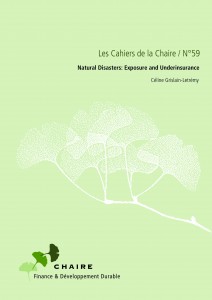Insurance coverage for natural disasters remains low in many exposed areas. A limited supply of insurance is commonly identified as a primary causal factor in this low insurance coverage. The French overseas departments provide a rare natural experiment of a well-developed supply of natural disasters insurance in highly exposed regions. The French system of natural disasters insurance is underwritten and regulated by the French government; instituted initially for metropolitan France only, it was extended to overseas departments in the state of emergency following Hurricane Hugo in 1989. This natural experiment makes it possible to analyze the determinants of insurance coverage on the demand side. Based on unique household-level microdata, I estimate an insurance market model which had not yet been empirically tested. Using this structural approach, I show that underinsurance in the French overseas departments is neither due to perception biases nor to unaffordable insurance, but mainly to uninsurable housing and to the anticipation of assistance, which crowds out insurance. Individual insurance decisions are influenced by neighbors’ insurance choices through peer effects and neighborhood eligibility for assistance.
Natural Disasters: Exposure and Underinsurance
This entry was posted in Working Papers. Bookmark the permalink.

